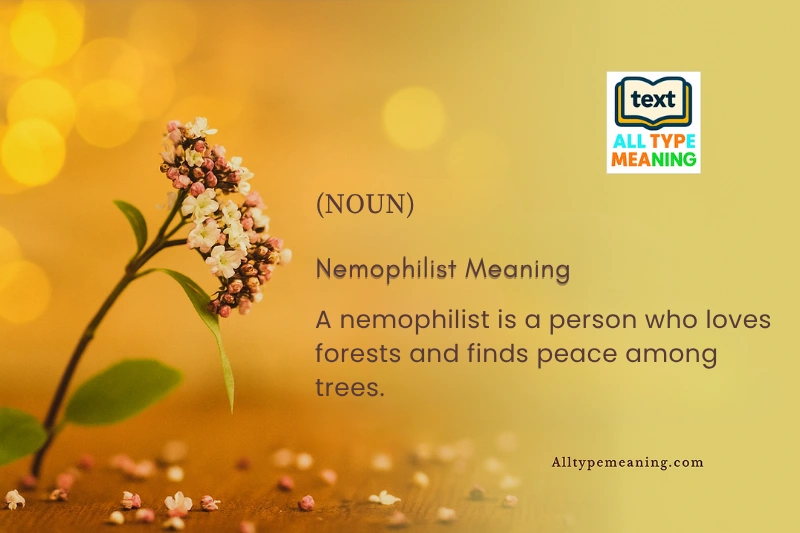Welcome to All Type Meaning!
Nemophilist meaning refers to someone who loves forests and finds peace among trees and nature. It’s a beautiful word that captures the deep bond between humans and the natural world. In today’s busy life, understanding words like nemophilist reminds us to slow down and reconnect with the serenity of nature. For students, professionals, and language learners, exploring such unique words not only expands vocabulary but also enriches expression.
Dive into this article to uncover the complete meaning, origin, and fascinating usage of nemophilist in everyday life
Quick Stats: Nemophilist at a Glance
| Attribute | Details |
|---|---|
| Word Type | Noun |
| Pronunciation | nem-oh-FIL-ist (IPA: /ˌnɛməˈfɪlɪst/) |
| Origin | Greek (nemos = grove/woodland + philos = loving) |
| First Known Use | Late 19th century |
| Popularity | Rising trend on social media since 2018 |
| Related Words | Nemophily (noun), nemophilous (adjective) |
What Does Nemophilist Mean? A Grammatical Overview
Definition: A nemophilist is a person who loves or is fond of woods, forests, and wooded areas. It describes someone who finds peace, joy, and inspiration in forest environments and seeks them out regularly.
Part of Speech: Noun (plural: nemophilists)
Phonetic Spelling: nem-oh-FIL-ist
IPA Notation: /ˌnɛməˈfɪlɪst/
Stress Pattern: The stress falls on the third syllable: nem-oh-FIL-ist
Usage Level: Formal to semi-formal; commonly used in literary contexts, nature writing, and social media captions.
Origin & Etymology: Where Does Nemophilist Come From?
The word “nemophilist” has beautiful Greek roots that reveal its meaning:
- “Nemos” (νέμος) = Greek word meaning “wooded pasture,” “grove,” or “glade”
- “Philos” (φίλος) = Greek word meaning “loving” or “fond of”
Combined together, these roots literally translate to “one who loves groves or woodlands.” The term emerged in the late 19th century during the Victorian era when there was a renewed interest in nature appreciation and romantic literature. Writers and poets of that time coined several “-philist” words to describe different types of nature lovers. While it wasn’t commonly used in everyday conversation historically, nemophilist has experienced a revival in the 21st century, particularly among millennials and Gen Z who are rediscovering nature-based vocabulary to express their environmental consciousness and love for outdoor experiences.
Nemophilist Meaning in Different Languages
Understanding nemophilist meaning across different languages helps connect this beautiful concept across cultures. Here’s a comprehensive table:
| Language | Script/Word | Transliteration | Meaning |
|---|---|---|---|
| English | Nemophilist | nem-oh-FIL-ist | A person who loves forests and woodlands |
| Hindi | नेमोफिलिस्ट / वन-प्रेमी | van-premi | जंगल से प्यार करने वाला व्यक्ति (One who loves forests) |
| Telugu | నెమోఫిలిస్ట్ | – | అడవులను ప్రేమించే వ్యక్తి (Person who loves forests) |
| Tamil | நெமோபிலிஸ்ட் | – | காடுகளை விரும்புபவர் (Forest-loving person) |
| Marathi | नेमोफिलिस्ट / वन-प्रेमी | van-premi vyakti | वनांवर प्रेम करणारी व्यक्ती (One fond of forests) |
| Urdu | نیموفلسٹ | – | جنگل سے محبت کرنے والا (Forest lover) |
| Malayalam | നെമോഫിലിസ്റ്റ് | – | വനങ്ങളെ സ്നേഹിക്കുന്നവൻ (One who loves forests) |
| Kannada | ನೆಮೋಫಿಲಿಸ್ಟ್ | – | ಕಾಡುಗಳನ್ನು ಪ್ರೀತಿಸುವವರು (Forest enthusiast) |
| Bengali | নেমোফিলিস্ট | – | বনপ্রেমী (Forest lover) |
| Gujarati | નેમોફિલિસ્ટ | – | જંગલ પ્રેમી (One who loves forests) |
| Punjabi | ਨੇਮੋਫਿਲਿਸਟ | – | ਜੰਗਲ ਪ੍ਰੇਮੀ (Forest lover) |
| Sanskrit | वनप्रियः | vana-priyah | वनेषु अनुरागं धारयति (One who has affection for forests) |
Reader Interaction & Social Hook
Are You a Nemophilist?
Take this quick check:
- ✅ You feel instantly calm when entering a forest
- ✅ You prefer hiking trails over shopping malls
- ✅ The smell of earth and pine makes you happy
- ✅ You’ve hugged a tree (no judgment!)
- ✅ Your phone wallpaper is forest scenery
Detailed Usage: How to Use Nemophilist Correctly
Contexts Where You Can Use Nemophilist:
✅ Personal Description: “As a true nemophilist, I spend every weekend hiking through dense forests.”
✅ Social Media Captions: “Nemophilist vibes 🌲✨ #ForestLover #NatureTherapy”
✅ Creative Writing: “The nemophilist wandered deeper into the ancient woodland, finding solace in the towering oaks.”
✅ Biographical Writing: “John Muir was perhaps America’s most famous nemophilist, dedicating his life to forest conservation.”
✅ Psychological/Wellness Context: “Many nemophilists practice forest bathing as a form of mental health therapy.”
Grammar Notes:
- Countable Noun: You can say “a nemophilist” or “nemophilists”
- Possessive Form: “The nemophilist’s favorite spot was under the willow tree”
- Adjective Form: While rare, you might encounter “nemophilous” meaning “forest-loving”
- Related Noun: “Nemophily” describes the love of forests as a quality or behavior
Common Collocations:
- True nemophilist
- Self-proclaimed nemophilist
- Dedicated nemophilist
- Born nemophilist
- Nemophilist at heart
Synonyms & Antonyms:
Synonyms
| Word | Meaning |
|---|---|
| Silvaphile | A person who loves forests and trees |
| Dendrophile | Someone who loves trees specifically |
| Forest lover | Simple term for one who loves forests |
| Woodland enthusiast | A person passionate about wooded areas |
| Nature lover | General term for those who love nature |
| Tree hugger | Informal term for environmental enthusiast |
| Arborist | Professional who loves and cares for trees |
| Outdoorsman/Outdoorswoman | Person who enjoys outdoor forest activities |
| Wilderness devotee | Someone devoted to wild, natural areas |
| Conservationist | Person who advocates for nature preservation |
Antonyms
| Word | Meaning |
|---|---|
| Urbanite | Person who prefers city life |
| City dweller | Someone who lives in and prefers urban areas |
| Indoorsy person | Someone who prefers staying indoors |
| Concrete jungle lover | One who prefers urban environments |
Words That Look Like Nemophilist
These words might appear similar but have different meanings:
- Neophilist – A person who loves new things and novelty (completely different meaning!)
- Bibliophilist – A person who loves books
- Zoophilist – A person who loves animals
- Oenophilist – A person who loves wine
- Nemophila – A genus of flowering plants (not related to forest love)
Tip: Don’t confuse nemophilist with “neophilist” – the extra ‘o’ makes all the difference!
Example Sentences: Nemophilist in Action
- Simple Usage: “Sarah is a nemophilist who spends her vacation camping in national forests.”
- Social Media Style: “Finally found my people at the forest retreat – surrounded by fellow nemophilists! “
- Literary Context: “The old nemophilist had walked these trails for fifty years, knowing every tree like an old friend.”
- Professional Context: “As a nemophilist and environmental scientist, Dr. Kapoor dedicates her research to forest conservation.”
- Reflective Statement: “I didn’t know I was a nemophilist until I realized that every happy memory of mine took place under tree canopies.”
- Comparative: “While my brother is a beach person, I’m a total nemophilist – give me pine trees over palm trees any day!”
- Cultural Context: “In Indian culture, many saints and sages were nemophilists, finding spiritual enlightenment in forest ashrams.”
Common Mistakes & Tips to Avoid Them
Spelling Mistakes:
❌ Nemophilis, Nemofilst, Nemofilist, Nemophelist ✅ Nemophilist (correct spelling)
Pronunciation Errors:
❌ NEE-moh-fuh-list (incorrect) ✅ nem-oh-FIL-ist (correct – stress on “FIL”)
Usage Mistakes:
❌ “I’m going to nemophilist this weekend” (wrong – it’s a noun, not a verb) ✅ “As a nemophilist, I’m going to the forest this weekend”
Grammar Tip:
Remember: Nemophilist is always a noun that describes a person. You cannot use it as a verb or adjective in standard English.
Cultural & Contextual Insight
Literary Significance:
The concept of nemophily appears throughout literature, even before the word was coined. Romantic poets like William Wordsworth and Robert Frost celebrated forest solitude in their works. In Indian literature, the concept resonates with “Aranyakas” (forest treatises) and the tradition of “vanaprastha” (forest-dwelling stage of life).
Modern Cultural Relevance:
Today, nemophilist has become popular on Instagram, Pinterest, and TikTok among:
- Travel bloggers documenting forest adventures
- Mental health advocates promoting “forest bathing” (Shinrin-yoku)
- Environmental activists raising awareness about deforestation
- Photographers specializing in woodland imagery
Regional Significance:
In countries like India, where forests hold spiritual significance (sacred groves, forest ashrams), being a nemophilist connects to ancient traditions of nature reverence.
Tips to Remember & Learn Nemophilist
Memory Tricks:
- Root Word Method: Think “Nemo (like the fish) lives in nature + philos (love) = loves forests”
- Visualization: Picture Captain Nemo from “20,000 Leagues” but in a forest instead of under the sea!
- Association: “Nem sounds like ‘nem-esis’ but instead of an enemy, forests are your friend (phil)”
- Acronym: Nature Enthusiast Moving Outdoors PHILosphically
- Rhyme: “When you’re feeling kinda stressed-ist, become a nemophilist!”
Related Words & Word Families
If you love the word Nemophilist meaning, you’ll enjoy these related terms:
Nature-Loving Words:
- Pluviophile – A person who loves rain
- Ceraunophile – A person who loves thunder and lightning
- Nyctophile – A person who loves the night
- Heliophile – A person who loves sunlight
- Thalassophile – A person who loves the sea
Forest-Related Terms:
- Sylvan – Relating to woods or forests (adjective)
- Arboreal – Living in or related to trees
- Verdant – Green with vegetation
- Woodland – Land covered with trees
- Glade – An open space in a forest
If you checked 3 or more, congratulations – you’re a nemophilist! Share this article with fellow forest lovers and use #Nemophilist on your next woodland adventure post!
Frequently Asked Questions
1. What exactly is a nemophilist?
A nemophilist is a person who has a profound love for forests, woods, and wooded areas. It describes someone who finds peace, happiness, and inspiration in forest environments and actively seeks out these natural spaces.
2. Is nemophilist a formal or informal word?
Nemophilist is a formal to semi-formal word that originated in literary contexts. However, it has gained informal popularity on social media platforms where people use it to describe their love for forests in captions and bios.
3. How do you pronounce nemophilist correctly?
Pronounce it as “nem-oh-FIL-ist” with the stress on the third syllable (FIL). The IPA notation is /ˌnɛməˈfɪlɪst/. Break it down: nem (like “hem”) + oh + FIL (like “fill”) + ist.
4. What’s the difference between nemophilist and dendrophile?
While both terms relate to nature love, a nemophilist specifically loves forests and wooded areas as complete ecosystems, whereas a dendrophile loves trees specifically, whether in forests, parks, or urban settings.
5. Can I use nemophilist on my resume or in formal writing?
Yes! Nemophilist is a legitimate English word suitable for formal contexts, especially in fields like environmental science, forestry, nature writing, or eco-tourism. It demonstrates sophisticated vocabulary and genuine passion for nature conservation.
Discover the complete UQC Full Form at All Type Full Form.

